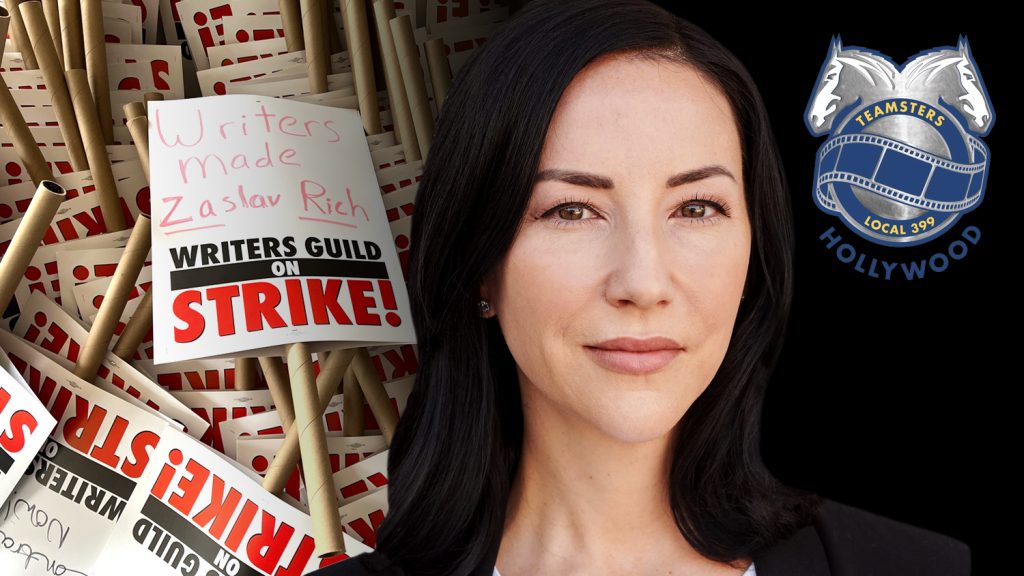Global Courant 2023-05-02 01:04:00
EXCLUSIVE: “There are folks that are working in the motion picture industry that are not making enough money to have a sustainable life, to be able to buy a home — which is just insane,” says Hollywood Teamsters leader Lindsay Dougherty of the hard economy realities her members and other Hollywood unions like the Writers Guild of America are being squeezed by.
It should be no great revelation that when the Teamsters talk, Hollywood may want to pay close attention.
“Insane especially when we’re all working for employers that have billions upon billions of profits and projected profits in the future with the new model of streaming,” the union Vice President and Director of the Teamsters Motion Picture Division adds of the studios. “This is not something that the employers should be getting a break on by any means.”
The Disneys, Apples, Warner Bros, Netflixs and more might be angling for a break, but as talks between the WGA and AMPTP look to go down to the wire tonight before the scribes’ contract expires and a possible strike begins, the Local 399 chief is making sure her members know where things stand in what could be a very fluid situation tomorrow. Emphasizing the current Teamsters’ contract, Dougherty and her team just sent out a dos and don’ts to their members this International Workers’ Day laying out what could come next and what’s the rules around picket lines.
Should the Alliance of Motion Picture and Television Producers (the AMPTP) be unable to address the real and reasonable issues the writers have brought to the table in bargaining, the WGA will be left with no other choice than to strike,” the FAQ email says (read it here).” We know it all too well – the workers that bring productions to life must constantly fight for their fair share … The nature of the industry is changing. The WGA is seeking to address economic equity, make improvements to working conditions and protect their work.”
The head of Local 399 since last year, the long-time labor leader and second-generation Teamster Dougherty has been a very vocal supporter of the scribes during the latest talks.
Besides showing up on the WGA’s side during negotiations with AMPTP at the latter’s Sherman Oaks’ offices last month, “The Teamsters stand with WGA members in their fight for a fair contract,” Dougherty and International Brotherhood of Teamsters general president Sean O’Brien declared on April 26. “We are monitoring negotiations closely. This is a shared fight and Teamsters will not cross picket lines.”
That said, Dougherty sat down with me to detail exactly what the position of the powerful Teamsters is if the WGA will go on strike. The labor leader also took a carving knife to the studios’ position on why now is not the time for significant increases, raised minimums, and more transparency. Additionally, Dougherty stated that now more than ever is the time for Hollywood unions and guilds to link arms literally and figuratively for a united front.
DEADLINE: As the clock ticks towards a possible strike, and talks between the WGA and the AMPTP continue today, what’s the Teamsters take on the situation right now?
DOUGHERTY: Well, if there is a labor action on Tuesday by the WGA, it’s going to impact the entire crews of certain productions especially those that are filming. So, we’re just preparing for what that looks like. Preparing our members and obviously giving them their rights and do’s and don’ts and what they should expect or not should expect and or shouldn’t expect. And so that’s pretty much what we’re preparing for now, but obviously won’t know if that’s the path going towards until midnight
DEADLINE: You sent out a dos and don’ts to your members today, what exactly is the status for Local 399 members if there is a strike and picket lines go up?
DOUGHERTY: So, the majority of Teamster contracts across the nation, not just exclusive to the motion picture industry, have a no strike clause. Let’s be clear, this will be the WGA’s strike, the Teamsters are not on strike. We are not able to strike during the term of our contract which is still in its cycle.
However, the second part of our no strike clause includes picket line language, which says, in so many words, that our members have the ability to honor a picket line that’s sanctioned by our joint counsel.
DEADLINE: With no repercussions?
DOUGHERTY: Members cannot be disciplined or terminated for refusing to cross a sanctioned picket line, that is pretty much the gist of our agreement. And, I should add, our members are told by the local unions to go to work and report to work as normal. However, if they come into contact with a physical picket line, that’s where their rights will be told to them, which we’re already doing that now. But that’s where they’ll make that moral decision as to whether or not they would cross that physical picket line.
DEADLINE: In that context, where do you think things are at, and will there be a strike?
DOUGHERTY: I honestly don’t know where we will be at midnight. And that’s the thing like no one truly knows because there’s still time to bargain.
DEADLINE: But you’ve been in those sessions, you know the players in the rooms…
DOUGHERTY: Although I’ve been in the bargaining sessions from time to time as an observer on behalf of the WGA I do not know the specifics, or if the employers are going to meet the demands of the Writers Guild. There’s no way of telling, but we have to prepare. Truthfully, there’s also only some amount of preparation you can do.
We can’t prepare that we’re on strike right now, or the WGA is on strike or anyone is on strike, for that matter.
It’s a waiting game for everybody.
And all I can tell our members is that we have a contract, and we have to abide by that contract. And we’ll have to see what happens with the Writers Guild.
DEADLINE: So, what’s your response to the studio’s argument that now is a bad time for a big increase. That times are tough, that there are too many unknowns in the industry to put up anything close to the around $600 million the writers are looking for?
DOUGHERTY: It’s absolute bullshit is what I think.
First of all, the argument from the employers years ago was oh, we don’t have the streaming platform that Netflix has. They were late to the game in streaming. And so, we heard the woes of how they weren’t making the box office numbers that they were before. And we’re seeing that now obviously they’re definitely making profits.
There are definitely employers at the table that can say that they have made profits continuously and will continuously make profits.
So, the piece of the pie that they’re offering, or crumbs to be honest, is not enough again to sustain a living wage in some of these areas where most of our members are like Southern California and New York. At this point, I think all of the unions and guilds have heard the argument. We don’t have enough money and it’s the same thing that we hear from all employers. But when you’re talking again about Netflix, Amazon, Apple, Disney, and all the layoffs that they’ve been doing, they’ve made bad business decisions as well.
DEADLINE: Are those bad business decisions partially what’s got us where we are, on the edge of a strike?
DOUGHERTY: Well, there’s a lot of trying to please Wall Street, isn’t there? These arguments by the studios, these are the things that my members don’t actually give a shit about, because they know how much money the employers are making. They see how much money they’re spending on a daily basis and throwing away money is quite common in this industry. So, that’s not going to cut in for any of us that especially for the Teamsters. It’s not going to cut it next year when we go into bargaining because my members don’t want to hear any of that shit anymore.
DEADLINE: Even before negotiations started last month between the WGA and the AMPTP, there were a lot of comparisons, pro and con, to the 2007-2008 writers’ strike. Are those comparisons slid in your opinion with all the changes we’ve seen in the industry in the past 15 years?
DOUGHERTY: Things are a lot different than 2007.
I will say I think after any strike any guild or union would learn from that strike, whether the right decisions or the wrong decisions were made. So, I think there’s that. But also, you know, the employers that the guilds and unions in Hollywood are negotiating with have changed as well, dramatically.
Now these tech companies like Amazon, Apple and Netflix are at the forefront of negotiations for all of us, and that was not the case in 2007. Along with Comcast and others, these are multi trillion-dollar corporations that obviously have other industries. Now they are making decisions in the room with the AMPTP. That’s a big difference as well.
I also think you’re seeing a change in the labor movement in general, not just in our industry, but in the United States as a whole. People are fed up with the terms and conditions that they’ve been working under, which essentially have been either watered down or suppressed in some way. And I think that’s what you’re seeing with the writers.
DEADLINE: Money is clearly one of the major issues this year, as it almost always is in labor talks. The WGA says with the shift to streaming, and the widespread changes that has brought to the industry being a Hollywood writer is no longer a middle-class profession, and that writers are struggling…
DOUGHERTY: They are…
DEADLINE: How?
DOUGHERTY: There are folks who are working in the motion picture industry who are not making enough money to have a sustainable life, to be able to buy a home — which is just insane. Insane especially when we’re all working for employers that have billions upon billions of profits and projected profits in the future with the new model of streaming. This is not something that the employers should be getting a break on by any means. And you’re seeing a situation after Covid where people are really taking a hard look inward as to what they need to have a middle-class life. Remember, the last time the Writers Guild negotiated was in the middle of COVID, without any leverage, and I think if they want to make true change, they have to fight for it.
DEADLINE: And for your members?
DOUGHERTY: Absolutely! It’s not just the writers. It’s also my Teamster members, too that can’t afford a home in Southern California.
DEADLINE: So, even a Hollywood labor leader, looking over that landscape, what do you do?
DOUGHERTY: Well, we’re going to have to address a lot of the economics in our own upcoming bargaining next year. Right now, I think, because of all the issues that we share, and because we’re part of the same labor movement, there’s more union solidarity right now among guilds that I’ve seen in a long time.
You know, the studios have done a really good job at dividing us throughout the years, and it’s time for that to be completely eradicated because the only way that we’re going to move forward in the best possible way is if we’re all together.
DEADLINE: Divide and conquer has always seemed to me to be their prime strategy…
DOUGHERTY: Yes, that’s what the studios have done, historically for the last several decades with the MPTP as an organization.
I’ll say, when I think about it now, it is insane to think that each individual labor union, whether it’s a local union or international is bargaining with the likes of Amazon, Disney, Paramount, you name it. They’re in there, and it’s us against them, but it’s only one of us against all of these multiple employers. No other industry that I’ve seen does this and it really is due time that we as labor unions and leaders in this industry get together and really move forward in a more powerful and meaningful way for all our members.
DEADLINE: With the difference each guild or union has, the needs they have, is that unity possible in the long term? I mean the DGA’s deal with the studios back in 2008 is what helped hobble the writers’ strike then. That divide and conquer approach from the AMPTP and the studios has been pretty successful…
DOUGHERTY: Sure, but I still think the only way that we’re going to make changes is if we do this together and fight together as unions and guilds in Hollywood.
Because really, it’s about our memberships as a whole in this industry. If anyone has a fight with the employers, it inherently becomes all of our fights. So, it’s due time that we stick together and move forward in a more powerful way. Because again, this is the only way we’re going to address the issues that this industry faces for all workers, not the employers but for the workers. And I think that’s how we have to move forward. Together.








